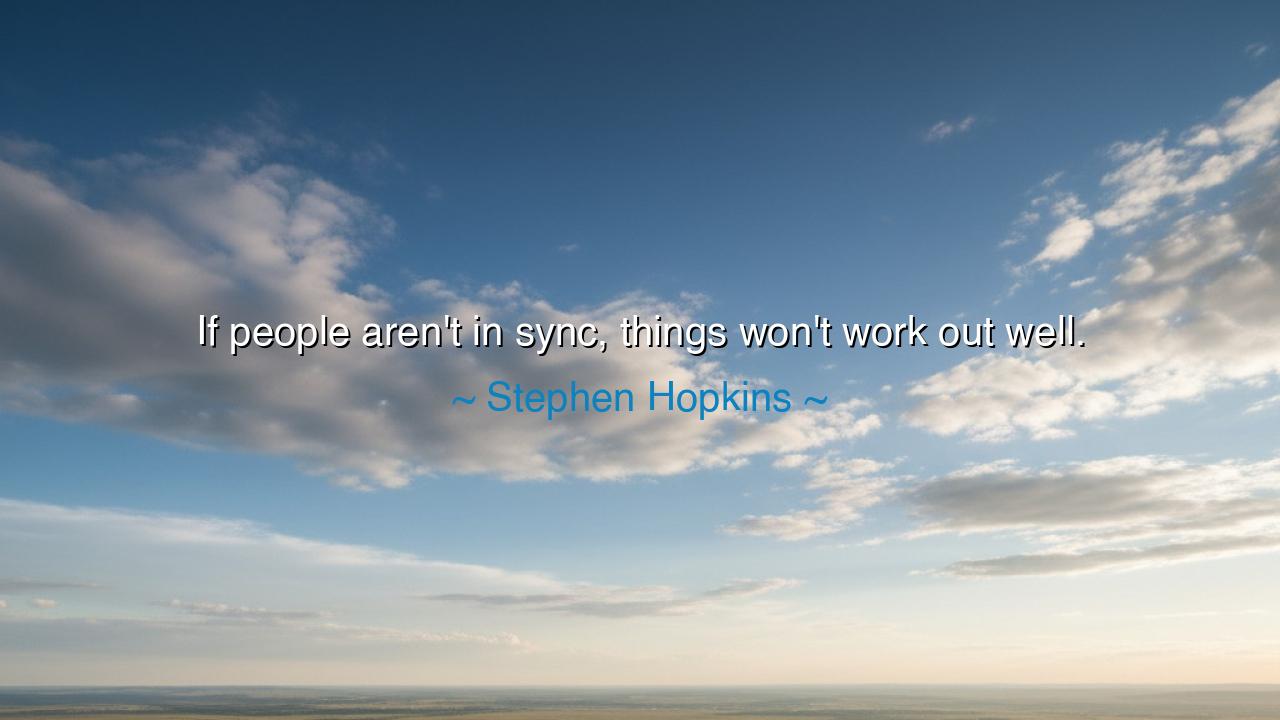
If people aren't in sync, things won't work out well.






Hear now, O children of time, the words of Stephen Hopkins, who declared: “If people aren’t in sync, things won’t work out well.” Though simple in form, these words carry the weight of eternal truth. They are like the steady drumbeat of an army marching to battle, reminding us that without harmony, no multitude can achieve greatness. For a single hand striking out of rhythm can disturb the music of an entire symphony, and a single step out of order can topple the march of an entire host.
The meaning lies in the sacred law of unity. When people are bound together in purpose, when their minds and hearts beat in rhythm, they can move mountains and tame the seas. But when they are scattered in spirit, when they act each upon their own will without regard for the whole, the house cracks, the ship founders, the tower falls. Thus, Hopkins teaches us that the strength of any endeavor does not dwell in numbers, but in synchrony, in the shared flow of spirit and intention.
The origin of these words reflects the wisdom of one who understood cooperation in the grand struggles of human enterprise. Stephen Hopkins, a signer of the Declaration of Independence, knew firsthand the peril of disunity. For the thirteen colonies were diverse and divided, their interests not easily reconciled. Yet he saw that unless they stood together, in sync, they would perish under the might of empire. His words were not idle musings, but forged in the fire of survival and the birth of a nation.
Consider also the ancient tale of the Greek phalanx, the wall of shields that defended cities and carved empires. Each warrior, bound in iron and courage, stood not as one but as part of a greater whole. If even a single soldier broke formation, the shield wall would open, and the enemy would pierce through. Their victory depended not on individual glory, but on the synchrony of many hearts beating as one. So it is in all human endeavor: without alignment, the strongest fail; with unity, the weakest prevail.
This teaching carries a lesson for every age. In our families, in our communities, in our labors, we must remember that discord weakens, while harmony strengthens. No business, no army, no household thrives when each pulls in different directions. A rope frays when its strands are scattered, but when woven together, it can pull the weight of worlds. So too must people bind their wills in synchrony to achieve lasting triumph.
Practical wisdom flows from this. If you walk in a team, seek not first your own glory, but the strength of the whole. Align your efforts, speak openly, and resolve conflicts before they grow into divisions. If you lead, labor not as a tyrant but as a conductor of music, bringing each voice into harmony. And if you follow, do so with faith, knowing that the unity of the group is the shield of all.
So let these words be etched in your soul: “If people aren’t in sync, things won’t work out well.” Strive always to build harmony, whether in the smallest task or the greatest undertaking. For in synchrony lies the secret of endurance, the path to victory, and the light that guides human destiny. Let us move as one, breathe as one, and labor as one, that the works of our hands may endure beyond the span of our years.






MDThanh Mai Dang
The idea of people not being in sync really resonates with me. It makes me reflect on how often teams struggle because they haven’t aligned their goals or strategies. What do you think is more important for alignment: clear expectations or emotional intelligence? Can a team thrive without perfect harmony, or does true success depend on complete synchronization?
NTThuy Nga Tran
This quote seems so simple yet holds a lot of truth. In a world where collaboration is key, people need to be aligned to achieve success. Do you think organizations should invest more in team-building activities to ensure better cohesion? Or is it simply about hiring the right individuals who naturally align with the group’s values and vision?
NMTran Nhat Minh
Stephen Hopkins’ perspective makes me think about how much we take alignment for granted in groups. When everyone is working towards a common goal, things flow smoothly. How do you ensure that each person understands their role and the bigger picture? Is it just about leadership, or is it about making sure everyone feels valued and heard within the team?
CDBach Bang Chau Do
I completely agree with this sentiment. It’s so true that when people aren’t in sync, everything starts to fall apart. But I wonder, how do you deal with situations where some members of the team are simply not on the same wavelength? Should we focus on improving communication, or is it better to address underlying values and goals to restore harmony?
TTTu Truong
This quote reminds me of the challenges we face in group settings. Sometimes, even with the best intentions, people don’t seem to work well together. Do you think it’s possible to fix these issues, or is it often just about finding the right people who naturally sync? How can we create environments that foster better collaboration and unity?